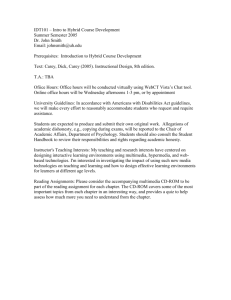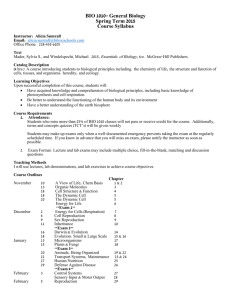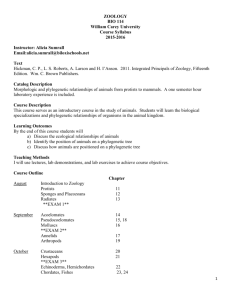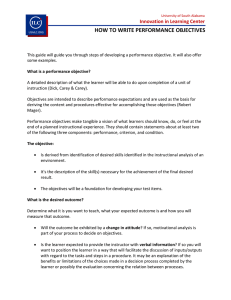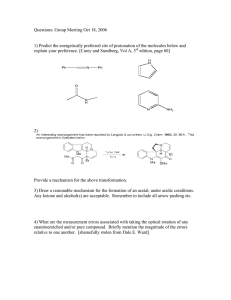I am pleased to introduce the next issue of the... significant conversations on campus—both surrounding David Dorondo’s persuasive piece on
advertisement
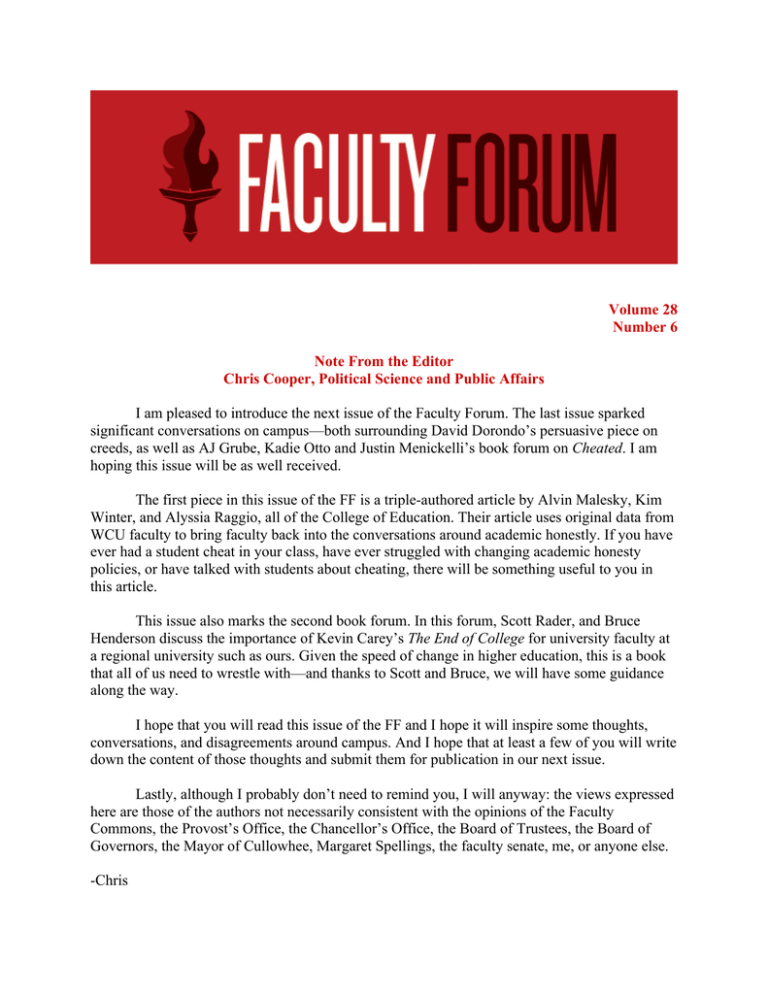
Volume 28 Number 6 Note From the Editor Chris Cooper, Political Science and Public Affairs I am pleased to introduce the next issue of the Faculty Forum. The last issue sparked significant conversations on campus—both surrounding David Dorondo’s persuasive piece on creeds, as well as AJ Grube, Kadie Otto and Justin Menickelli’s book forum on Cheated. I am hoping this issue will be as well received. The first piece in this issue of the FF is a triple-authored article by Alvin Malesky, Kim Winter, and Alyssia Raggio, all of the College of Education. Their article uses original data from WCU faculty to bring faculty back into the conversations around academic honestly. If you have ever had a student cheat in your class, have ever struggled with changing academic honesty policies, or have talked with students about cheating, there will be something useful to you in this article. This issue also marks the second book forum. In this forum, Scott Rader, and Bruce Henderson discuss the importance of Kevin Carey’s The End of College for university faculty at a regional university such as ours. Given the speed of change in higher education, this is a book that all of us need to wrestle with—and thanks to Scott and Bruce, we will have some guidance along the way. I hope that you will read this issue of the FF and I hope it will inspire some thoughts, conversations, and disagreements around campus. And I hope that at least a few of you will write down the content of those thoughts and submit them for publication in our next issue. Lastly, although I probably don’t need to remind you, I will anyway: the views expressed here are those of the authors not necessarily consistent with the opinions of the Faculty Commons, the Provost’s Office, the Chancellor’s Office, the Board of Trustees, the Board of Governors, the Mayor of Cullowhee, Margaret Spellings, the faculty senate, me, or anyone else. -Chris Faculty Upset: Is it the Cheating or the Policies…or Both? Alvin Malesky, Kim Winter, & Alyssa Raggio The literature indicates that violations of academic integrity (i.e., cheating) are pervasive among university students, occur across disciplines, and have been prevalent in higher education for decades (Bowers, 1964; McCabe & Trevino, 1997; McCabe, Trevino, & Butterfield, 2001). Alvin Malesky’s eyes were opened to this reality when students in his capstone course informed him that “just about everyone on campus cheats” and then proceeded to educate him on the best ways to cheat. Incidentally, students are using websites containing virtually every single test bank question imaginable for a little extra “help” during online exams! More recently Alvin dealt with a situation as department head in which students were alleged to have cheated in a faculty member’s online course. He was somewhat confused (as were the students and faculty member) when trying to interpret our relatively new policy regarding suspected violations of academic integrity. Alvin and colleagues Kim Winter and Alyssa Raggio wondered how others on campus were handling situations when they suspected that students had cheated. They also were curious if faculty truly understood the new academic integrity violation policy. The following details the experiences, views, and knowledge expressed by 154 WCU faculty members (representing all colleges): Nine hundred and seventy three students were suspected of cheating by the 154 respondents during the previous year (Mean=7; SD=26). Of these 973 students only 89 were reported for violating academic integrity per the university's academic integrity policy and reporting process. The discrepancy in these numbers is likely due to multiple factors including faculty not believing that they had sufficient evidence to prove their case and not wanting to deal with the university bureaucracy resulting from making a report. The majority of respondents (63%, N=92) reported that their preferred method of handling a student violating academic integrity was to follow the university’s formal academic integrity and reporting process. Twenty percent (N=30) reported a preference for dealing with the situation at their own discretion, while the remaining seventeen percent (N=26) selected “other,” with a common explanation being that a response depends on the specific situation. Respondents were asked to rate their awareness of WCU’s current academic integrity policy on a scale of 0 to 10, with 0 being completely unaware and 10 being very aware. The average reported score was 6.2 (SD=2.08). This ranking was followed by four questions assessing knowledge of WCU’s policy. The average score on this questionnaire was roughly two out of four questions correct. The questions (and answers) to the “quiz” are included at the end of this article. After completing the survey, 61 of the 154 respondents provided open-ended feedback. A qualitative analysis of the faculty comments by three independent reviewers revealed four common themes: dissatisfaction with the current policy (twenty responses), previous experiences with reporting violations (fourteen), concerns with technology (eight), and belief that the resulting consequences of cheating are not adequate (seven). Regarding the most common theme - dissatisfaction with the policy - specific complaints included the view that the process is too bureaucratic and time consuming, and that reporting a student causes distress to the student/professor relationship. One professor summed up these concerns by stating: The policy does not punish students adequately and places an undo [sic] burden on faculty and administrators. This extra work encourages individuals to NOT report violations. Also, following through with reporting and ultimately seeing students found “responsible” but not adequately “punished” makes faculty feel jaded and lacking in confidence in the system. Wordle containing every word from faculty comments: Considering the high rates of academic dishonesty, it is important for universities to consider the perspective of faculty members as well as students. This study found intense negative feelings about university policy and procedures regarding academic integrity as well as a concern that reporting does not yield adequate and necessary results. Nevertheless, there are quite a few on campus who would say that the policy was recently revised and updated in order to place faculty and students at the center of each case; that the purpose of revising the policy was so that faculty would have voice and input in the process. The current policy requires that communication between and among faculty, students, department heads, and deans all take place prior to a final decision. The dean has the final say after reviewing paperwork, holding a hearing, and, possibly, reviewing an appeal. Although the collective experience of the authors (department head, associate dean, and graduate student) indicates that while most understand that academic dishonesty is prevalent, it is clear that what we do about the various forms of cheating is not so well-defined. When given the opportunity to anonymously voice an opinion, faculty clearly felt a need to express their apprehension with the current policy. As an associate dean, Kim Winter believes that part of her role is to educate individuals about our current policy. Her experience has been that most do not understand the required steps as they move through the process and she has found students especially uninformed about their personal rights and responsibilities. In her view, some of the factors that make the reporting process unbearable (or, just plain “not worth it”) for faculty include the required comprehensive documentation, the awkward/uncomfortable/confrontational meeting and communication with student(s), the direct involvement of a department head and dean (who evaluate said faculty), and as mentioned before, the belief that not much really happens by way of consequences passed down on the student. Our results indicate that education and awareness about the policy and procedure, for both faculty and students, is necessary. However, knowledge alone will not deter cheating or increase reporting. Ensuring the use of these procedures by faculty members is necessary. But… How best to do so still remains a question! References Bowers, W.J. (1964). Students’ dishonesty and its control in college. New York: Bureau of Applied Social Research, Columbia University. McCabe, D.L., & Trevino, L.K (1997). Individual and contextual influences on academic dishonesty: A multicampus investigation. Research in Higher Education, 38, 379-396. McCabe, D.L., Trevino, L.K., & Butterfield, K.D. (2001). Cheating in academic institutions: A decade of research. Ethics & Behavior, 11, 219-232. Academic Integrity “Quiz” Question & Answers *http://www.wcu.edu/experience/dean-of-students/AcademicIntegrity/academicintegrity.asp 1. Within how many days is the instructor required to report an alleged violation of Academic Integrity? a. 2 days; b. 5 days (correct); c. 10 days; d. one month 2. Who does the instructor directly report the alleged violation to? a. The Department Head (correct); b. The Academic Integrity Board; c. The appropriate Academic Dean; d. The Associate Vice Chancellor of Student Affairs 3. What is the most intense sanction that the academic integrity board is allowed to issue to the offending student? a. Requiring them to drop the class.; b. An "F" in the course in which they cheated. (correct); c. Making up the assignments in which they cheated.; d. Suspending them from the university.; e. An “F” on the assignment in which they cheated. 4. After how many offenses is a student considered a "habitual offender"? a. 2; b. 3 (correct); c. 4; d. Book Symposium on Kevin Carey’s The End of College: Creating the Future of Learning and the University of Everywhere. Riverhead Books Scott Rader, Assistant Professor, Marketing Studentlearningmodes,pedagogicalprocesses,andtheuniversityitselfareall goingthrough,oratleastfacing,arevolutionakintowhatKevinCareyarticulatesinhis bookTheEndofCollege(2015;RiverheadBooks).Forevidence,Careyexplicatesthe explosionofinterestandoutletsforprivate-andpublic-sectoronlineeducationsolutions, increasedscrutinyoftheuniversity'sroleinanincreasinglycompetitiveglobalsociety,and thestarklychangingfaceofmodernlearners'andemployers'mobile-centered,highly collaborative,experientially-inclinedlives.AsCareyasserts,recognizingthegap(and correspondingopportunity)betweenthe21stcenturystudent'smodusoperandiandthe currentcollegelearningexperienceleavesuniversitiesatacross-roads. WhetheroneenvisionsthesamepathCareyarguestaking,oragreeswithhis versionofhistoryandcondemnationoftheacademy,ofimportanceishisinterrogationof theuniversity'sraisond'etre.Tobesure,Carey'scallfor"TheEndof[Traditional]College" isnotwithoutproblems.Forstarters,thewindowoftime(2011-2012)usedtoevaluatethe onsetofhispanacea--anonline-basededucationalrevolution--isfairlyacuteand, accordingly,myopic.Fiveyearslater,someofthetechnologicalandpolicyforcesthatwere atplaythenarenowseeminglyanachronistic.Anotherproblemiswhathasn'tchanged,at leastsubstantially.Despiteadvancesinboththeprivatesector(e.g.,KahnAcademy)and university(HarvardxandMITxCourseraMOOCs),thestaidbutsolidpersistenceofthe "bestinterests"oftheacademyprevails.Inhisoptimismforastudent-centered entrepreneurialsolution,Careyunderestimatestheinertiaofthisinstitutionaljuggernaut, andthepowergrantedtoitbytheStateandsociety. Despitethesepotentialchallenges,thedisruptiveforcesthatinspiredCarey's argumenthaveprecipitatedchangesthatresonatetodayandlikelyintothefuture.Atthe coreofthischangeisdemandfromthemarketitself:afluid,globalconstituencyof students,parents,andpotentialemployerswhoconstantlyshift,whether academicinstitutionsdoornot.AsprofessorsatWCUshouldknowwell,thecohortinthe modernclassroomisremarkablydifferentfromtheirowngenerations(i.e.,"GenerationX" or"BabyBoomers").Fundamentally,modesofinformationprocessingandknowledge acquisitionaredifferent.Contemporarylearners,steepedinmulti-mediaandmulti-tasking theirentirelives,absorbandunderstanddifferentlyfromthoseteachingthem.Takeas examplethetraditionaltooloflearning--atextbook--whichisnearlyanathemato familiar,faster,disaggregatedresourcessuchassearchablemultimedia(e.g.,YouTube), crowd-sourcedknowledge(e.g.,Wikipedia)andcollaborativeforumsforreal-time engagement(i.e.,socialmedia). Inthefaceofthisnewstudentpsyche,whichCareyarticulateswell,educatorsand academicsmustseparatetheanxietyofthe"loss"oftraditionalinfrastructurefromthe opportunitylatentinmeetingthedemandsofanever-volatileandvariegatedfabricof studentsandsociety.Aninnovativeupheavalislargelyinevitableifuniversitieswantto staynotonlyabreast,butrelevantinaninterconnected,globallylocalizedworld. Embeddedintheveryetymologyoftheword"university"isanexhortationtoconstantly monitor,consider,andreacttoabroadbaseofpossibilities,notonlyincurricularand programdevelopment,butinitsdeliverymechanismsasalignedwithachangingworld andtargetaudience. AdoptingsuchaversionofCarey's"hybrid"futureuniversity(partsonline,partsin classrooms)isbesetwithchallengesatuniversitieslikeWCU.Professorshere,like elsewhere,mightbeaversetosignificantchangeoftheircomfortablecurricula,especially aftertenurewhich,whilepurportingtoensureacademicfreedom,couldalsostiflethe "creativedestruction"inpedagogical,curricular,andprogramdevelopmentthatwouldbe necessarytoensureadifferentfuture.Mandatesfromadministration(andultimatelyfrom theState)canactuallypromotetheoppositeofthehybriduniversity.Forexample,"asset utilization"targetsatWCUplaceprimacy(andeconomicincentive)on leveragingphysicalresources,ineffectpenalizingprogramsthatmoveclassesonline. Finally,intheextantandgrowingcompetitivespaceforglobalonlineeducation, universitieslikeWCUareatadisadvantagelargelyduetotwoforces:1)tuitionconstraints anddifferentials(notbeingabletosetmarket-reflectiveprices;unfavorablevariationsin in-versusout-of-statetuition,and2)alackofmarketingprowess,giventhatmarketing theirservices,especiallytoabroaderaudience,hasnothistoricallybeenanimperative,and thereforenotaforte. Theendofcollegeisnotinevitable.Butitschangeis.Thefutureoftheuniversity mightbefoundinBloom'staxonomy.Inthefaceofanelectronicaccumulationand disseminationof"allthereistoknow",application,analysis,andsynthesisbecomekey.The valueoftheprofessormightbecomeoneofcurationandcoaching:cullingtheinformation, separatingthewheatfromthechaffasitwere,andintegrating/re-integratingthis knowledgeintoacontextuallyrelevant,hopefullyengaging,andcriticallyinfusedplatform foranalysis,evaluationandcreativity. Bruce Henderson, Professor of Psychology ItwouldbeeasytodismissKevinCarey’sbook.Hiscontentionsarefrequently pretentious,unremittinglyarrogant,andsometimesjustsilly.Ifyoubelievemodern universitiesserveapublicserviceandyouhavehighbloodpressure,donotreadthisbook. However,aftertellingyouwhyIthinkthisbookisseriouslyflawed,Iwilloutlinesome issuesraisedbyCareythatwewouldbeshortsightedtoignore. Careygivesabriefhistoryofhighereducationtoillustratehowthemodernhybrid universitycameintobeing.Thehybriduniversitycombinestwofunctionsthatshouldhave beenkeptseparate:researchandteaching.Professorsteach,poorlyforthemostpart becausetheywerenevertrainedtoteach,inordertomakealivingwhiletheypursuewhat theyreallywanttodo—theirresearch.Theevidencethatprofessorsteachpoorlycanbe foundinArumandRoska’sAcademicallyadrift,a2011reportshowingthatmostcollege studentsdonotlearnmuchofanythinginthefirsttwoyearsofcollege.Theself-interested facultyandadministratorsatthehybriduniversitiesmaintainamonopolyonthe disseminationofknowledgethroughanaccreditationprocesstheycontrolthatrequires institutionstohaveallkindsofexpensivefeaturestheydonotreallyneed.Thecostofa highereducationhasgoneoutofcontrolasthehybriduniversityhasconvincedthegeneral publicthattheyneedaRolexwhenthencouldmanageperfectlywellwithaTimex. Happily,inCarey’sview,thedaysofthehybriduniversityarenumbered.Atthis verymoment,thehybriduniversitiesarelosingtheirstrangleholdonknowledgeandits dissemination.ItisabouttobereplacedbytheUniversityofEverywhere.Insteadofhaving todealwithhackslikethoseofusatWCU,studentscanhaveaccesstothegreatestteachers atgreatspeedandlowcostwithoutgettingoutoftheirpajamas.MITandHarvardare givingitaway.OnceSiliconValleybreaksthemonopolyofaccreditationbydolingout credible“badges”insteadofcredits,therewillbeneedforonlyahandfulofhigh-quality universitiesthatwillgenerateanddisseminateknowledgetotherichandpooraroundthe world.Theseuniversitieswillusethemassiveamountsoflearningdatatheyaccumulateto buildrobottutorswhowillpersonalizethelearningprocessandobviatetheneedfor teachers.Collegediplomas,uninformativeaboutwhatwasactuallylearned,willbe replacedbyextensivefilesfromtheUniversityofEverywherethatwillincludecourse syllabi,classnotes,problemsets,andmeta-analyticsdescribingtheirofferings. Wow.ThingshavechangedfasterthanIthoughtinthelastfewyears.Butthereare someflawsinCarey’spresentation.First,oneofCarey’sfundamentalassumptionsisthat teachingandresearcharenegativelyrelated.Studentsarenottaughtwellbecause professorsarebusywiththeirresearch.Infact,everyreviewoftherelevantliteraturehas concludedthatthequalityofteachingandqualityresearcharenotrelated(exceptintheir competitionforthefacultymember’stime).Thepositiverelationshipmanyadministrators andprofessorsliketotoutisnotthere,butknowingifsomeoneisagoodresearcherornot tellsyounothingabouttheirteaching,andviceversa.Moreover,eveninthemajorresearch universities,professorsprettyconsistentlyreportasmuchinterestandinvolvementin theirteachingasintheirresearch. Second,Careyoverreliesonasinglesourceforevidencethatthehybriduniversity hasutterlyfailedtoeducateitsstudents.AcademicallyAdriftisaworkseriously,ifnot fatally,flawedinitmethodologyandinterpretations.Itsimplytellsuslittleornothing aboutwhetherstudentsarelearning.Third,Carey,inhishastetounbundlethefunctionsof thehybriduniversity,hasfailedtorecognizetheircommonbaseinscholarship.Notjustthe bodyofscholarship,norresearchandpublishing,buteachfacultymember’sindividual developingexpertiseinadiscipline.Goodteaching,goodresearch,andgoodcommunity service(whichisignoredentirelybyCarey)havetobebasedinthecontinuingscholarship ofthefacultymember.Finally,Careyconveysarathersimplistic,passiveviewoflearning. Heappearstobelievethatthereisawell-definedbodyofknowledgeandskillsetsthatcan beacquiredbyjustaboutanyonefromwatching,listeningandinteractingwithtutors designedbyartificialintelligence(usingmagicalmetadatathatemergesfromhuge datasets).Aviewthatlearningisaconstructiveprocessdependingonadynamicinterplay amongteachers,learnersandmaterialtobelearnedseemsforeigntoCarey,despitehis gratuitousreferencestoVygotskyandPiaget. Therehavebeensomeexcellentcriticalreviewsofthisbookelsewhere,I particularlyrecommendonebyFrankPasquales.(Therearealsosomeincisivecritiquesof thetechnologyCareyhassomuchfaithin,includingZemsky’sonMOOCs(pages237-243in the2014volumeoftheJournalofGeneralEducation)andafunnypiecebyMichaelSheain TheSkinnyinwhichhedescribestakinga5-weekcourseonastrobiologyandthesearchfor extraterrestriallifefromtheUniversityofEdinburghthathesuccessfullycompleted (“Impressivework!”)oneday(withbreaksfordoinglaundryandplayingfootball). Sowhynotjustdismissthisbook?Becausethoseofuswhoworkinthetraditional universitiesareatriskforlosingouttotheUniversityofEverywhereifwedonotattendto ourbusiness.WhydoIthinkweareatrisk?Herareafewreasons: 1.SometimestheMOOCs,theedXs,andtheMinervasdodoabetterjobthanwedo. Intoomanycasestheyaremorepresentintheirstudents’livesthanweare.Walkthrough WCU’shallsmostanyafternoonandseewhoisthere.Thestaffisthere,thefacultynotso much.Dowereallyneedalltheexpensiveinfrastructureforsolitaryscholarspursuing individualgoals?Isitpossiblethattheresidentialcollegeispassé?Justhowdifferentis whatwehavetoofferfromwhatthestudentscangetfromSiliconValley?Intermsof curriculum,howisWCU’ssetofindefensiblylongmenusofshamefullydisconnected coursesthatconstituteswhatwecall“liberalstudies,”reallyallthatdifferentfromthe UniversityofEverywhere(andEverything)? 2.Whenallwedoinourcoursesistransferinformation,webegintolooklike Carey’sparodyofus.Whenwefailtoadequatelychallengeourstudents,don’tmakethem read,write,andthinkenough,weareasuselessasCareysays.Whenwecancelclass,let studentsoutearly,don’tusethefinalexamperiodthatisaweekofourinstructional responsibility,whenwegiveA’sandB’sformiddlingwork,wesetourselvesuptobe replacedbytheUniversityofEverywhere. 3.Wecosttoomuch.WhilethecostofattendanceattheUNCsystemschoolsislowerthan itisatmostplaces,itisstillmoreexpensivethanitneedbe(adjustedforinflation,the annualcostofattendancehasapproximatelytripledsinceIcametoWestern).Aminorityof studentsavoidsignificantdebt.Thearmsraceforfancydorms,reccenters,intercollegiate athletics,andconvenientparkingmakesusuncompetitivewiththeUniversityof Everywhere.Webuildarchitecturallyimpressivestructureswithhugeatriaratherthan utilitarianstructuresthatfitbasiclearningneeds.AtleastatUofEyoudon’tpayfor hundredsofdollarsforfacilitiesyoudon’tuseandgamesyoudon’tattend.Whileincreases indirectfacultycompensationhavehadlittleroleintheskyrocketingcostsofhigher educationoverthepast30years,facultymembersarenotblameless.Teachingloadshave shrunktomakewayforresearchandamyriadofstudentservice(“administrative”) positionsthatdidnotexistagenerationagodosobecausefacultyhavepassedon responsibilitiesforadvising,tutoring,sponsoringandsupervising.Ifwearenotconscious ofhowweaddtotheexpenses,webecomeripefortheunbundlingbargainbasement servicesofSiliconValley. Istheendofcollegeinsight?NotifwemakesurethecollegeofCullowheeisa significantlybetterexperiencethanwhatstudentscangetattheUniversityofEverywhere.
